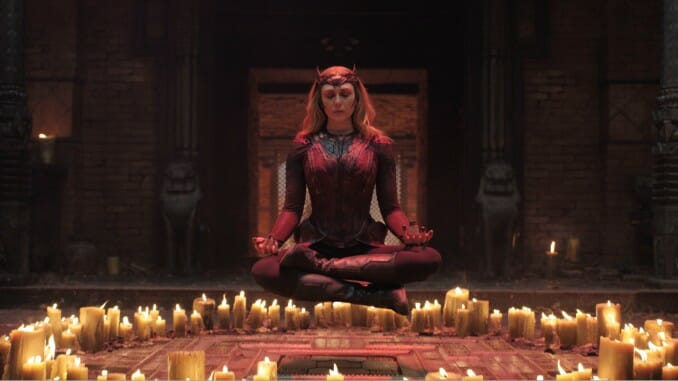Doctor Strange and the Insidious Misogyny of the MCU

It’s often more difficult than it should be to be a female fan in the genre space, and that goes double when you’re talking about superhero properties. Despite important strides forward in recent years, the medium is still heavily dominated by male characters and male-centric stories. Female heroes are far too often left to languish on the sidelines, serving as love interests or plot devices—if they’re lucky, sometimes both. And though female viewers are ostensibly welcomed in this space, there’s a sadly pervasive sense that we’re part of this fandom on a sort of “guest pass” basis, and we should simply be grateful for the crumbs of representation we get.
Because while Marvel Studios is certainly eager enough to tout its feminist bonafides by pointing to Captain Marvel or Black Widow, the franchise still waited for 20 films to feature a female lead in Carol Danvers (Brie Larson) and sat on a Natasha Romanoff (Scarlett Johansson) solo outing for so long the character died first, essentially rendering the project useless for any larger storytelling purpose…beyond introducing her sister (and obvious replacement) Yelena (Florence Pugh). And don’t even get me started on the crass pandering that was that “all-female team-up” moment in Avengers: Endgame, as though letting a bunch of women stand near each other is the same thing as giving them things like interiority, emotional depth or stories of their own.
It’d be one thing if the larger franchise was simply ignoring its women, or featuring one female character for every five men. Most women who spend any time watching genre properties regularly are sadly all too used to this. (It’s the Eowyn effect, writ large.) And, to be fair, Marvel has greenlit a ton of female-led series under its Disney+ banner, from WandaVision and Hawkeye to Echo, She-Hulk and Ms. Marvel. But it still often feels like the entire franchise is trapped in a holding pattern of one step forward, two steps back when it comes to its women. The truly maddening thing about the MCU is that, although it actually has a ton of great female characters, it often seems to have no idea what to do with them, frequently defaulting to the most simplistic storytelling choices and behaving as though simply including women on its canvas is the same thing as writing for them. Nowhere is this sort of insidious misogyny more apparent than the MCU’s treatment of the Scarlet Witch.
To be fair, Wanda Maximoff (Elizabeth Olsen) certainly isn’t the only woman the MCU has done dirty in recent years. The Falcon and the Winter Soldier turned all-American good girl—and Peggy Carter’s (Hayley Atwell) niece!!—Sharon Carter (Emily Van Camp) into the leader of an international criminal syndicate. Loki judged Sylvie (Sophie Di Martino), a female variant of the God of Mischief, much more harshly than any of the male versions of the character—and they’re all literally the same person. Laura Barton (Linda Cardinelli) was apparently once a kickass S.H.I.E.L.D. agent, but her primary role in Hawkeye is to serve as little more than Clint’s (Jeremy Renner) emotional sounding board.
But no single female character’s treatment can compete with what Wanda has endured, simply because she has been going through it for the better part of a decade now. From Avengers: Age of Ultron, where she is introduced as a brainwashed Hydra captive to Captain America: Civil War, in which her very existence—and a tragic, well-meaning mistake—is the catalyst by which the globally oppressive Sokovia Accords are enacted, she’s constantly being punished for powers she doesn’t entirely understand and never asked for. She’s forced to kill the love of her life not just once but twice during Avengers: Infinity War in the name of saving the world from Thanos. Her reward? Getting blipped out of existence for five years, and none of her alleged friends can even be bothered to call her afterward. At this point, who’s even angry at her for mind controlling some random New Jersey town? (Just kidding. Mostly.)
But while WandaVision is essentially perfect television and leads with both honesty and empathy as it finally wrestles with the sheer scope of grief and trauma that Wanda has had to endure up until this point, it’s also apparently the exception that proves the rule. Because by the time Doctor Strange in the Multiverse of Madness rolls around, all that nuance is out the window. Gone is that layered, complex Wanda. In her place is simply a witch: A scheming, manipulative, murderous archetype who’s suddenly monstrous instead of sympathetic, who seeks to replace her lost children by stealing another woman’s.
-

-

-

-

-

-

-

-

-

-

-

-

-

-

-

-

-

-

-

-

-

-

-

-

-

-

-

-

-

-

-

-

-

-

-

-

-

-

-

-








































